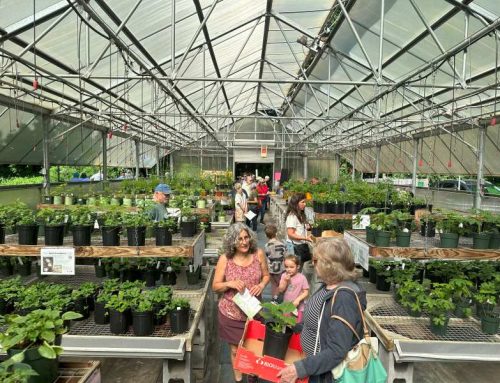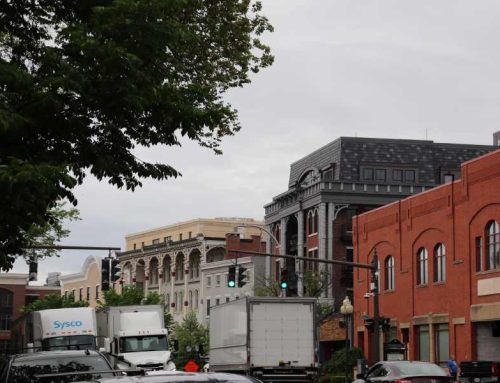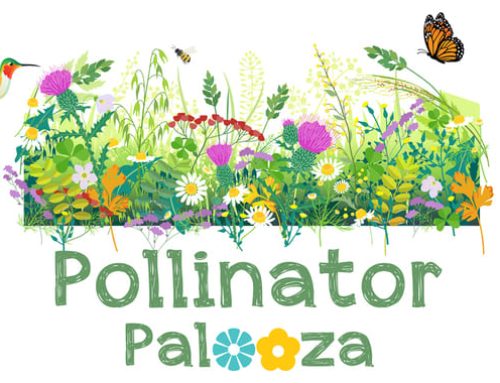
We accomplished a lot this year with the help of our many supporters, including the continuation of our most popular programs and the addition of several new initiatives and programs. New staff members have allowed us to make organizational improvements, including expanding and improving our ability to share information about sustainability issues with our community. We recently completed our 5 year strategic plan, which lays out our vision for the future. Below, we highlight our committees’ 2018 accomplishments.
Housing and Urban Planning
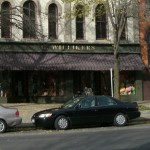 We have long advocated for the City Council to initiate a managed parking system for downtown Saratoga Springs through contact with City Hall, letters to the editor, and community educational forums. While we are disappointed that this effort has again stalled, we remain committed to pushing for a comprehensive parking system that addresses sustainability issues while also meeting the needs of businesses, residents and visitors alike.
We have long advocated for the City Council to initiate a managed parking system for downtown Saratoga Springs through contact with City Hall, letters to the editor, and community educational forums. While we are disappointed that this effort has again stalled, we remain committed to pushing for a comprehensive parking system that addresses sustainability issues while also meeting the needs of businesses, residents and visitors alike.

We support initiatives that improve the safety and accessibility of a cleaner, greener transportation system. This summer, we asked the City Council to install bike lanes on Lake Avenue to encourage residents and visitors to reach their destination on bikes rather than automobiles. Bike lanes would help reduce traffic congestion, parking demand and auto-related air pollution. People want to live, work and shop in walkable/bikeable neighborhoods.
 Pocket parks are small areas of open space for people to eat their lunch, take a work break, or meet up with friends. Pocket parks entice people to go outside, get some exercise, and be social. We have been pushing for more pocket parks in the city, including one in front of the Excelsior Avenue City Waterworks Plant, which is an area with a high density of new development.
Pocket parks are small areas of open space for people to eat their lunch, take a work break, or meet up with friends. Pocket parks entice people to go outside, get some exercise, and be social. We have been pushing for more pocket parks in the city, including one in front of the Excelsior Avenue City Waterworks Plant, which is an area with a high density of new development.
We pushed for sustainability issues (recycling, transportation planning, street trees, renewable energy, housing, environmental protection) to be addressed in the proposed Charter, and for departments and staff responsible for sustainability functions to be clearly identified. In addition, because many sustainability issues require interdisciplinary approaches, we asked that the Charter provide clear guidance for the effective coordination of sustainability efforts among all City departments.
Urban Forestry
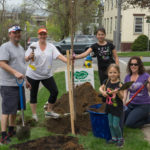 Urban forests play a significant role in moderating temperatures, reducing stormwater flows, improving air quality, reducing building energy use, and increasing property values. Sustainable Saratoga has been working to expand our urban forest over the last ten years, planting our 225th tree during our eighth Tree Toga event this spring. We continue to advocate for more tree planting by the City, and are partnering with local groups to increase tree planting in areas of the city beyond our city streets. We continue to be a resource for other local communities, including Glens Falls and Schuylerville, which are working to grow their urban forests.
Urban forests play a significant role in moderating temperatures, reducing stormwater flows, improving air quality, reducing building energy use, and increasing property values. Sustainable Saratoga has been working to expand our urban forest over the last ten years, planting our 225th tree during our eighth Tree Toga event this spring. We continue to advocate for more tree planting by the City, and are partnering with local groups to increase tree planting in areas of the city beyond our city streets. We continue to be a resource for other local communities, including Glens Falls and Schuylerville, which are working to grow their urban forests.
Zero Waste
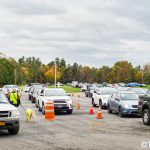
We are proud to live in a community that values responsible waste reduction. Our second Saratoga Recycles Day was hugely successful. Almost 800 vehicles came through the SPAC parking lot to recycle over 26 tons of electronics and donate several tons of clothing/textiles, 108 bikes, and notions to be used by local non-profits working with people in need. Diverting these items from the waste stream also reduces our overall demand for landfill space, as well as the amount of toxins being dumped in landfills.
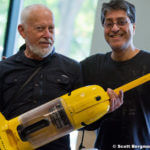 Co-sponsored with Saratoga Springs Public Library, we created a Repair Café in Saratoga Springs. So far in our first two events, our talented volunteer repair coaches have helped people to repair over 100 items, including vacuums, record players, jackets, clock, bikes, and so much more! By extending the life of broken items, we are keeping these things out of the landfill and decreasing the environmentally costly production of new consumer products.
Co-sponsored with Saratoga Springs Public Library, we created a Repair Café in Saratoga Springs. So far in our first two events, our talented volunteer repair coaches have helped people to repair over 100 items, including vacuums, record players, jackets, clock, bikes, and so much more! By extending the life of broken items, we are keeping these things out of the landfill and decreasing the environmentally costly production of new consumer products.
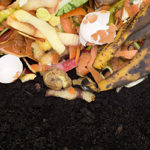 Food waste is a huge source of landfill waste that could easily be diverted. Food waste produces methane in landfills, so finding ways reduce food waste a great way for individuals to reduce their carbon footprint. We think backyard composting is something that everyone can do, so we offer composting workshops with compost bins offered at a reduced price. This year, the program trained 38 more people how to compost in their own backyard.
Food waste is a huge source of landfill waste that could easily be diverted. Food waste produces methane in landfills, so finding ways reduce food waste a great way for individuals to reduce their carbon footprint. We think backyard composting is something that everyone can do, so we offer composting workshops with compost bins offered at a reduced price. This year, the program trained 38 more people how to compost in their own backyard.

Climate and Energy
The greenest energy is energy you did not use in the first place. That is why we teamed up with AHP (a non-profit working with NYSERDA) to sponsor a home energy audit workshop to help people apply for free home energy audits and no/reduced cost loans for energy saving upgrades in their home.

